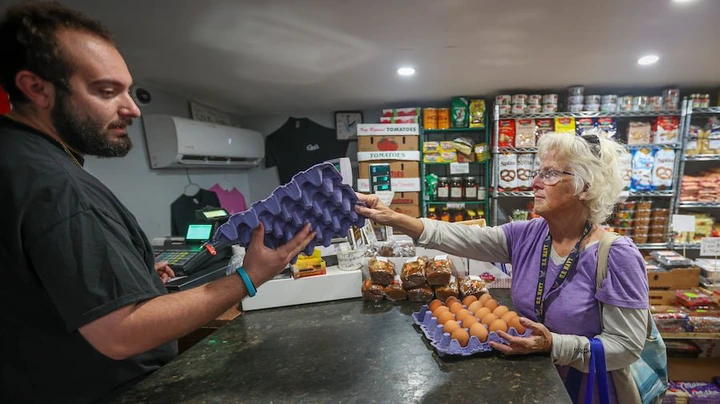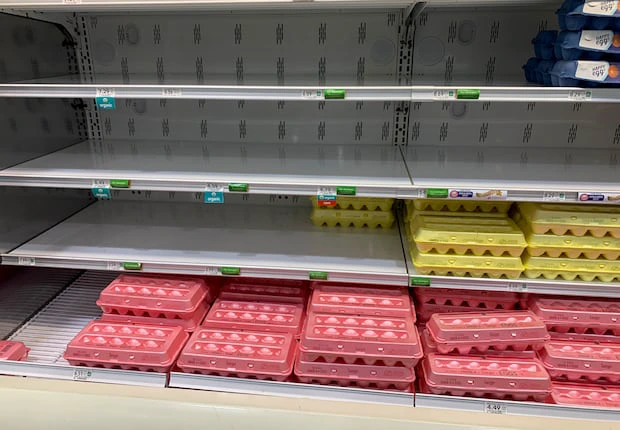Food
A Salute to Vibrant Women
2025-03-10 11:25:09
View pictures in App save up to 80% data.
Nicola Nice, a sociologist, entrepreneur, and author discussed her new book about the role of women in cocktail history at the historic Laird & Company distillery in Colts Neck. Laura D.C. Kolnoski
Written by Laura D.C. Kolnoski
COLTS NECK – “Here’s to the gracious hostess whose warm welcome is truly delightful and whose delightful cordial is a perfect treat.”
Introducing a captivating new book that explores the role of women in shaping the history of cocktails and cocktail culture: “The Cocktail Parlor: How Women Brought the Cocktail Home” by Nicola Nice, Ph.D. (2024 Countryman Press). This delightful read makes for an ideal gift during a festive season brimming with celebrations.
Spanning from the 1800s to contemporary times, this 216-page historical recipe book showcases over 100 adaptations of traditional cocktails, featuring drinks like Martha Washington’s Happy Hour Punch and the Green Skirt, which draws inspiration from the Harlem Renaissance. The chapters highlight beverages that gained popularity in various periods, and also include recipes for syrups and unique flavor inspirations.
On a recent Sunday, Nice discussed her book with invited guests at the circa 1700s headquarters of Laird & Company, America’s oldest distiller and holder of U.S. Distillery License No. 1, issued after the repeal of Prohibition. Family-owned and run for nine generations, the company’s vice president and world ambassador is Lisa Laird-Dunn, whose grown children have now joined the business.
Laird-Dunn and her son Gerard organized the afternoon event with the help of Night Owl Hospitality from Asbury Park, presenting dishes inspired by "The Cocktail Parlor" that featured Laird's products.
View pictures in App save up to 80% data.
Lisa Laird-Dunn, vice-president of the company her family has led since the 1700s, shared some of her family’s historic artifacts during a recent tour of the headquarters. Laura D.C. Kolnoski
Nice met Laird-Dunn, whom she regards as a mentor, through the Women’s Cocktail Collective, an organization established in 2015 to support female professionals in the liquor sector by facilitating networking opportunities and raising funds for charitable initiatives. Originally from Britain, Nice relocated to the U.S. in 2007, just as the cocktail revival was gaining momentum, and made New York her home.
“Few women were running liquor companies then,” said Nice, founder and CEO of Pomp & Whimsy Gin. “Lisa is so humble, kind and generous. She’s the hostess with the mostest, as Pearl Mesta was called.” Mesta, profiled in Chapter 5, “The Grand Hostess,” was renowned for her cocktail parties in the 1920s through 1940s, populated by famous guests. She was America’s first ambassador to Luxembourg and the nation’s first female ambassador. The Black Russian was created in Mesta’s honor and she was immortalized in Irving Berlin’s 1950 musical “Call Me Madam.”
“As a commercial sociologist focused on cocktail trends during the day and an avid cocktail enthusiast by night, I have always been captivated by the rituals of hospitality and the social evolution of food and beverages,” stated Nice, who consults for major companies such as beverage giant Diageo. “With ‘The Cocktail Parlor,’ we finally shine a well-deserved light on women's contributions to cocktail history.”
Driven by a sense of purpose, Nice set out to gather female-authored literature spanning the last two centuries, encompassing everything from domestic management and etiquette manuals to culinary and hosting guides. Her initial intrigue soon turned into exasperation when she realized the scarcity of resources on women's contributions to cocktail culture. This led her to reach out to author Robert Simonson, who had shared his list of the most impactful cocktail books on Instagram. When she highlighted that none of his selections featured female authors, he encouraged her to create her own book, utilizing the insights she had gained from her extensive research.
Simonson, present at the Laird’s event, penned the foreword for “The Cocktail Parlor,” remarking, “The straightforward yet significant insight that Dr. Nice revealed… is that homemakers played an equally important role in the proliferation of cocktail culture as the saloon proprietors.”
“Cocktails emerged as a trend during the late Victorian period,” she noted, mentioning that women played a significant role in popularizing timeless drinks such as the martini, Manhattan, and old-fashioned. Barred from exclusive clubs, women—who became the “Chief Entertainment Officers at home”—established their own cocktail lounges. The first extensive cocktail guide, released in 1862 by bartender Jerry Thomas, featured numerous cordial liquors that were actually concoctions women had been creating for ages to preserve fruits, combat illness, enhance wellness, and add flavor to their meals.
View pictures in App save up to 80% data.
Gerard Laird-Dunn, currently collaborating with his mother Lisa and sister Emilie in their family enterprise, mixed Jersey Girl cocktails featuring Laird spirits, much to the enjoyment of the guests in attendance. Laura D.C. Kolnoski
“I aimed to share the tale of the cocktail and the remarkable women associated with it, who led captivating lives, including their struggle for women's rights,” Nice remarked. “During the Gilded Age, women wielded significant social influence, participating in tea gatherings that also served as suffragette meetings. Back then, they were barred from entering bars and could only visit restaurants during the day or for dinner accompanied by men.”
The book delves into the transformation of formal cocktail gatherings that began in the 1950s and ’60s, leading to the more relaxed house parties we see today. It includes insights on craft cocktails, essential bar cart items, key pantry ingredients, glassware choices, and tips for delivering a heartfelt toast at any event. Notable figures such as the late Julia Child, Barbara “B.” Smith, and Martha Stewart are featured throughout. The concluding chapter focuses on no-proof cocktails, offering innovative recipes that reinterpret classic drinks with the use of homemade cordials and teas.
After Nice's presentation, Laird-Dunn guided the guests through her family's historic residence, which now serves as the firm's offices. She shared personal stories and historical insights about her family, highlighting Laird's significance in American history. Laird-Dunn was the final family member to reside in the well-known white house with yellow shutters located at the intersection of Laird Road and Route 537, where she lived with her parents. She also became the first female member of her family to take the helm of the company since her grandmother assumed leadership following her grandfather's passing.
“This is my top choice for a location,” Laird-Dunn remarked as she swung open the door to Bonded Warehouse No. 1. Once inside, visitors discovered that the company is responsible for producing the majority of Applejack and American Apple Brandy available, utilizing three to four million apples during the distillation period. The diverse apple varieties are sourced from Virginia, with the finishing touches completed at the Colts Neck site.
The company's inaugural sales record dates back to 1780, but the family had been producing their product a century earlier at the location that is now known as the Colts Neck Inn on Route 537. George Washington frequented this stagecoach stop, and legend has it that, after some convincing, he became the sole individual outside the family to acquire the Applejack recipe. At that time, Robert Laird, the owner, provided Washington's troops with the alcoholic beverage.
"As the tour wrapped up, Laird-Dunn stepped behind the bar in the main barrel aging warehouse, saying, 'We reserved specific casks for this occasion. This is where the real magic occurs.'"
read more



